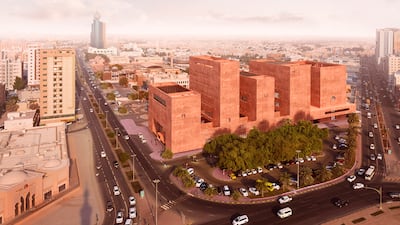The Africa Institute has unveiled plans for its new, 32,000-square-metre campus in Sharjah, designed by Ghanaian-British architect David Adjaye.
The institute is slated to welcome its first set of students in 2023, said Hoor Al Qasimi, who founded the organisation in 2018. It has been programming events and research seasons since that first announcement, but with the confirmation of plans for the building, moves closer to its full ambition of being a premier research institute for African studies.
The new site will house archives, a library, and lecture and performance halls, as well as host visiting scholars and fellows, and stage art and music events. As a degree-granting institute for students earning their master's and PhD qualifications, the institute will also effectively function as a university campus.

Adjaye, who recently designed the National Museum of African American History and Culture in Washington, DC, said he was inspired by North African domestic architecture for his latest creation. He proposed a campus composed of five tower blocks, with air circulating between these structures allowing for pools and gardens on the ground floor as places for scholars to talk and meet. The reddish-brick colour of the design is a nod to the iron oxide typically found in North African soil.
“In making a new institute, we wanted to make sure that we were rooting the discourse in the north of Africa and the Arab and Middle East peninsula,” said Adjaye in a press conference. “We wanted to understand the architecture of communities that were incubating all kinds of scholarly life and also agrarian life – and to think about the modernity of cities, and to see if we could create an architecture that would understand the history, but also look to the future, to create a new skyline.”
The design for the building is superb, departing from the glass and steel style of recent constructions in the Mena region, in favour of a more authentic regional vernacular. It is also enormous, and a testament to the investment Sharjah is making in this new centre of research.
The institute will sit next to Africa Hall, the lecture theatre that Sheikh Sultan Al Qasimi built in 1976 to host the Afro-Arab Symposium. That event was a product of the solidarity movements of pan-Arabism and pan-Africanism, and brought together important African and Arab scholars, economists and thinkers to understand how the two regions could collaborate. In invoking this legacy, Hoor Al Qasimi knowingly returns to a moment of transnational support among non-western nations, which the institute will explore in the realm of culture and social sciences.
The geographical position of the UAE, the institute director Salah M. Hassan noted, makes it a natural site from which to understand the crossroads of migration and trade that traverse the Arabian Sea.
“This area has had a host of different types of population mixing and linkages with Africa,” says the scholar, who is also a professor at Cornell University. “One of the major assets of this institute is that it will be exploring lesser-known diasporas of the Indian Ocean, in addition to those across the Atlantic, which is very well known.”
Al Qasimi also revealed that influential curator Okwui Enwezor had given his archives to the institute. Enwezor was an important influence on Al Qasimi, who established the Sharjah Art Foundation in 2009. She has often told the story of her being exposed to the potential of contemporary art after seeing his 2002 Documenta. That year's version of the event, an art exhibition held in Kassel every five years, is widely credited with introducing works from the Global South to the contemporary art world, and Enwezor became the leader in a generation that substantially revised art's geographical boundaries.
Born in Nigeria, Enwezor also helped to define the field of contemporary African art, and Hassan worked with him on the journal Nka, which the two founded with Nigerian-American artist Olu Oguibe. Enwezor will also posthumously curate the next Sharjah Biennial, which he had been due to direct, via a team of curators and scholars who will carry out his ideas. That biennial has been postponed to 2023, when the Africa Institute should also open its doors.
The donation of Enwezor's archive is a high-profile starting point for what will become an important aspect of the institute. African archives – the key to understanding the past – are mostly held in European or American museums and universities, or have not been properly catalogued, digitised or stored.
“There are so many archives of intellectuals and families of major thinkers in Africa that have been scattered or are in disarray,” says Hassan. "We are hoping to be part of them … This is part of our rethinking the ideas of postcoloniality and decolonisation.”
Al Qasimi described Enwezor's donation as a great honour. "As he said, the West doesn't have to own or to monopolise the archives."


